Period 3; 定语从句完整
- 格式:ppt
- 大小:1.33 MB
- 文档页数:33
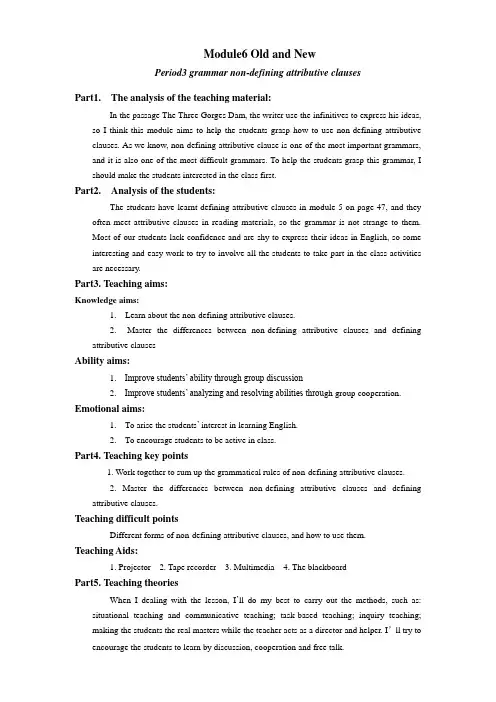
Module6 Old and NewPeriod3 grammar non-defining attributive clausesPart1. The analysis of the teaching material:In the passage The Three Gorges Dam, the writer use the infinitives to express his ideas, so I think this module aims to help the students grasp how to use non-defining attributive clauses. As we know, non-defining attributive clause is one of the most important grammars, and it is also one of the most difficult grammars. To help the students grasp this grammar, I should make the students interested in the class first.Part2. Analysis of the students:The students have learnt defining attributive clauses in module 5 on page 47, and they often meet attributive clauses in reading materials, so the grammar is not strange to them.Most of our students lack confidence and are shy to express their ideas in English, so some interesting and easy work to try to involve all the students to take part in the class activities are necessary.Part3. Teaching aims:Knowledge aims:1. Learn about the non-defining attributive clauses.2. Master the differences between non-defining attributive clauses and definingattributive clausesAbility aims:1.Improve students’ ability through group discussion2.Improve students’ analyzing and resolving abilities throu gh group cooperation. Emotional aims:1. To arise the students’ interest in learning English.2. To encourage students to be active in class.Part4. Teaching key points1. Work together to sum up the grammatical rules of non-defining attributive clauses.2. Master the differences between non-defining attributive clauses and definingattributive clauses.Teaching difficult pointsDifferent forms of non-defining attributive clauses, and how to use them.Teaching Aids:1. Projector2. Tape recorder3. Multimedia4. The blackboardPart5. Teaching theoriesWhen I dealing with the lesson, I’ll do my best to carry out the methods, such as: situational teaching and communicative teaching; task-based teaching; inquiry teaching;making the students the real masters while the teacher acts as a director and helper. I’ll try to encourage the students to learn by discussion, cooperation and free talk.In addition, I’ll make the best of multimedia to make the class more lovely, interesting and high-effective.Part6. Teaching Procedures 45’Step1 Lead in 12’1. Lead in the lesson of the unit by showing some sentences which they learnt on page47 about defining attributive clauses on screen. Ask students read the sentences and answerwhat clauses they are.(1) Su Song was an eleventh-century monk who(m) very little is known about.(2) For example, it is the country which silk was first invented in.2 review the relative pronouns and relative adverbs which usually used in attributiveclauses.(1) Relative pronounsas,which,who,whom,whose, that(2) Relative adverbswhen, where, why(Purpose: review defining attributive clauses which students learnt on module 5.)3. Ask students read above sentences and do exercise1’s sentences on page 54, thencheck the answer and find out the common and the difference of these sentences.(Purpose: lead in the topic: non-defining attributive clauses.)Step2 Non-defining attributive clauses 20’1.Encourage the students to sum up the differences between non-defining attributiveclauses and defining attributive clauses by themselvesIn a defining attributive clause(1) The information given is essential to understand the sentence, and make it clearwhich person or thing you are talking about in a sentence.(2) You don’t need a commaIn a non-defining attributive clauses(1) The information is not essential to understand the sentence, but it provides additionalinformation.(2) Punctuation is important, common are used to separate the clause from the rest of thesentence.(3) ‘That’ canno t be used in a non-defining attributive clause.2. The definition of non-defining attributive clause.When a attributive clause merely describes an object without having the function of defining or identifying to which object the speaker or writer is referring, the clause must be placed between commas. Such a clause can be called a non-defining or non-limiting relative clause, i.e., a non-defining relative clause gives extra information about a noun or noun phrase and has commas at both ends.(Purpose: this part is designed to make the students understand the definition of non-defining attributive clauses and the difference between non-defining attributive clausesand defining attributive clauses, at the same time lead to the next part.)Step3 Practice 8’Get the students to finish excercise2 and 3 on page 54, and then check the answer. I’ll divide the students into 2 groups, and then ask them to finish the tasks by competition and cooperation. If anyone answers the question correctly, his or her group will get 1 point, and the group which gets the most points is the winner.(Purpose: To consolidate the usage of non-defining attributive clauses, at the same time increase the students ‘interest in their studies)Step4 Summary 4’First, ask the students to d iscuss “What have you learnt this class?”Then give the summary: This class we learn the grammatical items of non-defining attributive clauses. We know the differences between non-defining attributive clauses and defining attributive clauses are common and the information given is essential or not essential to understand the sentence.Step 5Homework 1’Revise the use of non-defining attributive clauses.Part 7 Blackboard designNon-defining attributive clauses(1) Relative pronouns : as,which,who,whom,whose, that(2) Relative adverbs: when, where, whyNon-defining attributive clauses(1) The information is not essential to understand the sentence, but it provides additional information.(2) Punctuation is important, common are used to separate the clause from the rest of the sentence.(3) ‘That’ cannot be used in a non-defining attributive clause.(Purpose: the blackboard design can reflect the teacher’s ability of mastering the text and leading the students to master the text easily. It also tells the students that this is the important points in this class.)Above is my teaching plan of this lesson. Thank you for listening.。
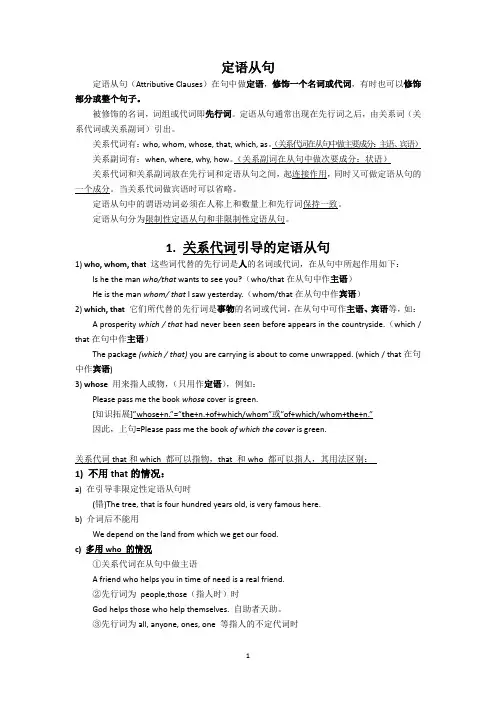
定语从句定语从句(Attributive Clauses)在句中做定语,修饰一个名词或代词,有时也可以修饰部分或整个句子。
被修饰的名词,词组或代词即先行词。
定语从句通常出现在先行词之后,由关系词(关系代词或关系副词)引出。
关系代词有:who, whom, whose, that, which, as。
(关系代词在从句中做主要成分:主语、宾语)关系副词有:when, where, why, how。
(关系副词在从句中做次要成分:状语)关系代词和关系副词放在先行词和定语从句之间,起连接作用,同时又可做定语从句的一个成分。
当关系代词做宾语时可以省略。
定语从句中的谓语动词必须在人称上和数量上和先行词保持一致。
定语从句分为限制性定语从句和非限制性定语从句。
1.关系代词引导的定语从句1) who, whom, that这些词代替的先行词是人的名词或代词,在从句中所起作用如下:Is he the man who/that wants to see you?(who/that在从句中作主语)He is the man whom/ that I saw yesterday.(whom/that在从句中作宾语)2) which, that它们所代替的先行词是事物的名词或代词,在从句中可作主语、宾语等,如:A prosperity which / that had never been seen before appears in the countryside.(which / that在句中作主语)The package (which / that) you are carrying is about to come unwrapped. (which / that在句中作宾语)3) whose用来指人或物,(只用作定语),例如:Please pass me the book whose cover is green.[知识拓展]”whose+n.”=”the+n.+of+which/whom”或”of+which/whom+the+n.”因此,上句=Please pass me the book of which the cover is green.关系代词that和which 都可以指物,that 和who 都可以指人,其用法区别:1)不用that的情况:a) 在引导非限定性定语从句时(错)The tree, that is four hundred years old, is very famous here.b) 介词后不能用We depend on the land from which we get our food.c) 多用who 的情况①关系代词在从句中做主语A friend who helps you in time of need is a real friend.②先行词为people,those(指人时)时God helps those who help themselves. 自助者天助。
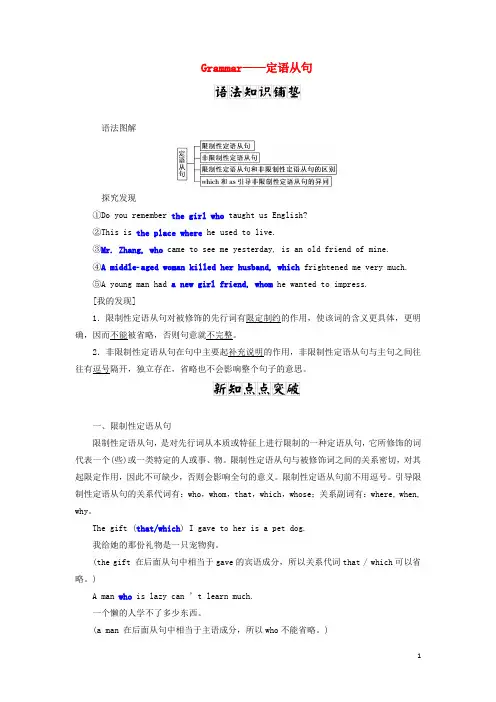
Grammar——定语从句语法图解探究发现①Do you remember the girl who taught us English?②This is the place where he used to live.③Mr. Zhang, who came to see me yesterday, is an old friend of mine.④A middleaged woman killed her husband, which frightened me very much.⑤A young man had a new girl friend, whom he wanted to impress.[我的发现]1.限制性定语从句对被修饰的先行词有限定制约的作用,使该词的含义更具体,更明确,因而不能被省略,否则句意就不完整。
2.非限制性定语从句在句中主要起补充说明的作用,非限制性定语从句与主句之间往往有逗号隔开,独立存在,省略也不会影响整个句子的意思。
一、限制性定语从句限制性定语从句,是对先行词从本质或特征上进行限制的一种定语从句,它所修饰的词代表一个(些)或一类特定的人或事、物。
限制性定语从句与被修饰词之间的关系密切,对其起限定作用,因此不可缺少,否则会影响全句的意义。
限制性定语从句前不用逗号。
引导限制性定语从句的关系代词有:who,whom,that,which,whose;关系副词有:where, when, why。
The gift (that/which) I gave to her is a pet dog.我给她的那份礼物是一只宠物狗。
(the gift 在后面从句中相当于gave的宾语成分,所以关系代词that / which可以省略。
)A man who is lazy can ’t learn much.一个懒的人学不了多少东西。
(a man 在后面从句中相当于主语成分,所以who不能省略。
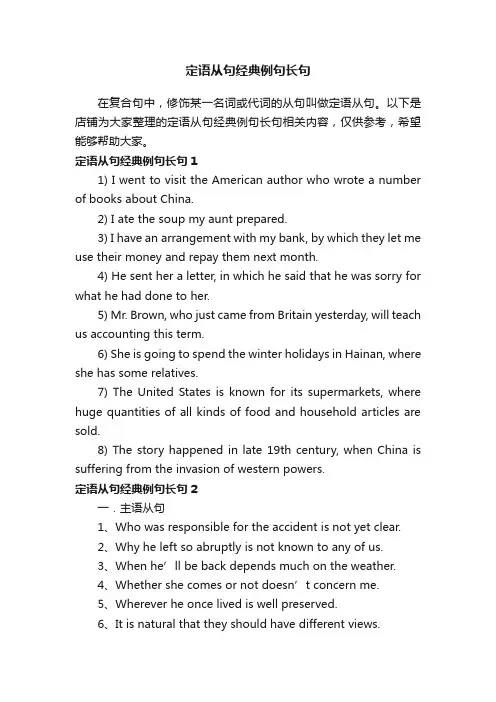
定语从句经典例句长句在复合句中,修饰某一名词或代词的从句叫做定语从句。
以下是店铺为大家整理的定语从句经典例句长句相关内容,仅供参考,希望能够帮助大家。
定语从句经典例句长句11) I went to visit the American author who wrote a number of books about China.2) I ate the soup my aunt prepared.3) I have an arrangement with my bank, by which they let me use their money and repay them next month.4) He sent her a letter, in which he said that he was sorry for what he had done to her.5) Mr. Brown, who just came from Britain yesterday, will teach us accounting this term.6) She is going to spend the winter holidays in Hainan, where she has some relatives.7) The United States is known for its supermarkets, where huge quantities of all kinds of food and household articles are sold.8) The story happened in late 19th century, when China is suffering from the invasion of western powers.定语从句经典例句长句2一.主语从句1、Who was responsible for the accident is not yet clear.2、Why he left so abruptly is not known to any of us.3、When he’ll be b ack depends much on the weather.4、Whether she comes or not doesn’t concern me.5、Wherever he once lived is well preserved.6、It is natural that they should have different views.7、It was quite plain that she didn’t want come.8、It’s a pity that he can’t swim.9、It was a fearful disappointment to your mother that you didn’t come yesterday.10、It happened that she wasn’t in that day.11、It struck me that we ought to make a new plan.12、It was rumored that he was suffering from a tone in the kidney.13、It is estimated that 25 million school lunches are sold each day.14、Where I spend my summer is none of your business .15、It’s doubtful whether the payment is legal.16、It was a question whether he should get married.17、What the professor said is of great importance.18、Whoever break the rules will be punished.19、Who killed the scientist remains a question.20、It doesn’t matter whether she will come or not.二.宾语从句1、 We never doubt that he is honest.2、I can’t imagine what made him act like that.3、 Nobody can tell when she will arrive.4、Before I came downstairs I had prepared myself very carefully for what I must say.5、 You must give it back to whoever it belongs to.6、I’ve heard that you’ve won a scholarship.7、 I feel it a terrible thing that my mother should have to toil so endlessly.8、 We are talking about whether we admit students into our club.9、 He told me that he was preparing for the English test.10、Our teacher told us that light travels much faster than sound.11、Can you tell me how I can get to the zoo?12、The doctor insists that I give up smoking.13、She remember nothing about him except that his hair is black.14、I suggest that they shouldn’t drive along the coast.15、Have you found out how wide the ditch was?16、Tomorrow at this time we will know who is elected?17、Everybody knows that money doesn’t grow on tree.18、The villager didn’t realize how serious the pollution was until the fish in the river died.19、She said that she would come to the meeting.20、The book will tell you what the best CEO should do.三.表语从句1、The fact is that he didn’t notice the car until too late.2、The mystery is whether he ever went there at all.3、The question is why he likes the place so much.4、The problem is not who will go but who will stay.5、Your brother’s health is not what it used to be.6、The question is whether they will b able to help us.7、His suggestions is that we should stay calm.8、It sounds as if someone is knocking at the door.9、He looked just as he had looked ten years ago.10、That is because h e didn’t understand me.11、That is why he got angry with me.12、The problem is who we can get to replace her.13、The trouble is that I lost her address.14、The questions is whether we can rely on him.15、That is because we are in need of money at that time.16、He looked as if he was going to cry.17、The reason why he has to go is the his mother is ill in bed.18、The questions is whether it is worth doing.19、The mountain is no longer what is used to be.20、The questions is what caused the accident.四.同位语从句1、They had to face the fact that the nearest filling station is 30 miles away.2、Have you any idea how soon they are coming?3、Obviously there was little probability that they would succeed, but they didn’t mind.4、The suggestion that the new rule be adopted came from the chairman.5、There is a feeling in me that it is going to rain.6、The proposal has been put forward that the flight should be cancelled.7、The government gave an order that all the house should be pulled down in three weeks.8、We haven’t s ettled down the question where we are going to spend our summer vocation.9、There is no doubt that he will keep his promise.10、Many British parents hold the view that teenagers shouldn’t spend too much time online.11、The thought that they could cross the whole continent was exciting.12、I’ve come to the conclusion that it was unwise to do that.13、They expressed the wish that she accept the award.14、The question whether it is right or wrong depends onthe result.15、The rumor spread that a new school would be built here.16、The questions who should do the work require consideration.17、The suggestion that the new rule be adopted came from the chairman.18、The news that oil price will go down is untrue.19、The question why so many animals died suddenly in that area remains unsettled.20、We have no scientific proof for the idea that time travel is impossible.定语从句经典例句长句3feel sorry for famous people who live their lives in the glare of publicity.我真可怜那些要在众目睽睽之下生活的名人。
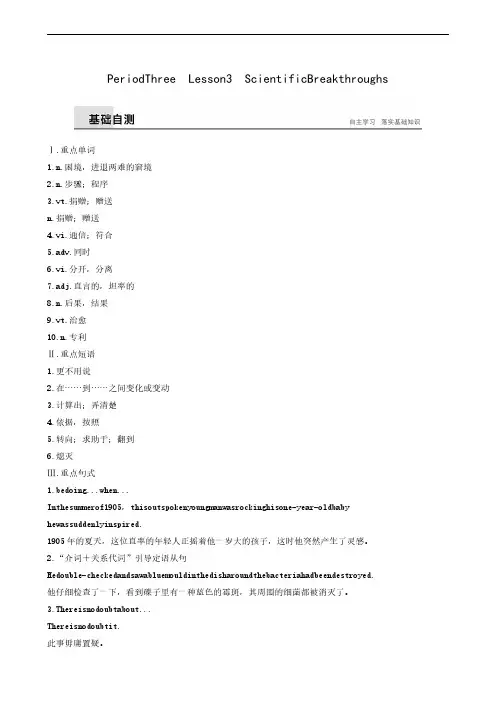
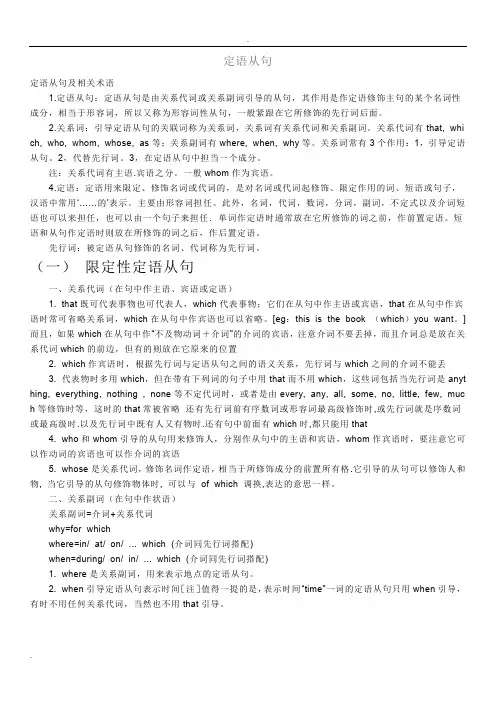
定语从句定语从句及相关术语1.定语从句:定语从句是由关系代词或关系副词引导的从句,其作用是作定语修饰主句的某个名词性成分,相当于形容词,所以又称为形容词性从句,一般紧跟在它所修饰的先行词后面。
2.关系词:引导定语从句的关联词称为关系词,关系词有关系代词和关系副词。
关系代词有that, whi ch, who, whom, whose, as等;关系副词有where, when, why等。
关系词常有3个作用:1,引导定语从句。
2,代替先行词。
3,在定语从句中担当一个成分。
注:关系代词有主语.宾语之分。
一般whom作为宾语。
4.定语:定语用来限定、修饰名词或代词的,是对名词或代词起修饰、限定作用的词、短语或句子,汉语中常用‘……的’表示。
主要由形容词担任。
此外,名词,代词,数词,分词,副词,不定式以及介词短语也可以来担任,也可以由一个句子来担任.单词作定语时通常放在它所修饰的词之前,作前置定语。
短语和从句作定语时则放在所修饰的词之后,作后置定语。
先行词:被定语从句修饰的名词、代词称为先行词。
(一)限定性定语从句一、关系代词(在句中作主语、宾语或定语)1. that既可代表事物也可代表人,which代表事物;它们在从句中作主语或宾语,that在从句中作宾语时常可省略关系词,which在从句中作宾语也可以省略。
[eg:this is the book (which)you want。
]而且,如果which在从句中作“不及物动词+介词”的介词的宾语,注意介词不要丢掉,而且介词总是放在关系代词which的前边,但有的则放在它原来的位置2. which作宾语时,根据先行词与定语从句之间的语义关系,先行词与which之间的介词不能丢3. 代表物时多用which,但在带有下列词的句子中用that而不用which,这些词包括当先行词是anyt hing, everything, nothing , none等不定代词时,或者是由every, any, all, some, no, little, few, muc h等修饰时等,这时的that常被省略还有先行词前有序数词或形容词最高级修饰时,或先行词就是序数词或最高级时.以及先行词中既有人又有物时.还有句中前面有which时,都只能用that4. who和whom引导的从句用来修饰人,分别作从句中的主语和宾语,whom作宾语时,要注意它可以作动词的宾语也可以作介词的宾语5. whose是关系代词,修饰名词作定语,相当于所修饰成分的前置所有格.它引导的从句可以修饰人和物, 当它引导的从句修饰物体时, 可以与of which 调换,表达的意思一样。
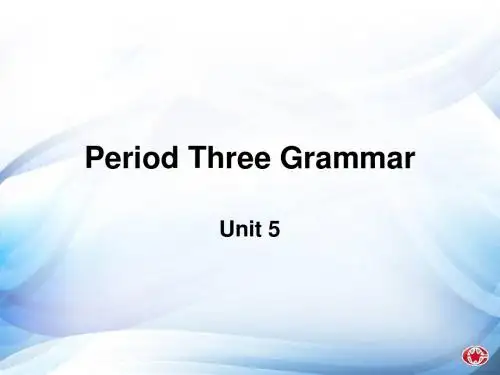
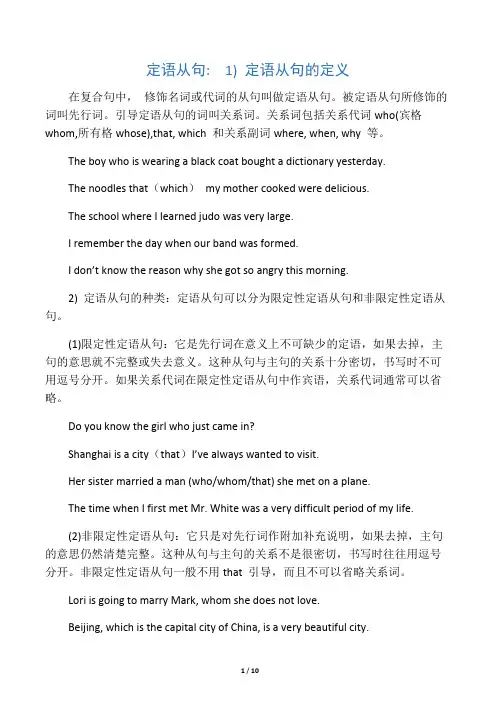
定语从句: 1) 定语从句的定义在复合句中,修饰名词或代词的从句叫做定语从句。
被定语从句所修饰的词叫先行词。
引导定语从句的词叫关系词。
关系词包括关系代词who(宾格whom,所有格whose),that, which 和关系副词where, when, why 等。
The boy who is wearing a black coat bought a dictionary yesterday.The noodles that(which)my mother cooked were delicious.The school where I learned judo was very large.I remember the day when our band was formed.I don’t know the reason why she got so angry this morning.2) 定语从句的种类:定语从句可以分为限定性定语从句和非限定性定语从句。
(1)限定性定语从句:它是先行词在意义上不可缺少的定语,如果去掉,主句的意思就不完整或失去意义。
这种从句与主句的关系十分密切,书写时不可用逗号分开。
如果关系代词在限定性定语从句中作宾语,关系代词通常可以省略。
Do you know the girl who just came in?Shanghai is a city(that)I’ve always wanted to visit.Her sister married a man (who/whom/that) she met on a plane.The time when I first met Mr. White was a very difficult period of my life.(2)非限定性定语从句:它只是对先行词作附加补充说明,如果去掉,主句的意思仍然清楚完整。
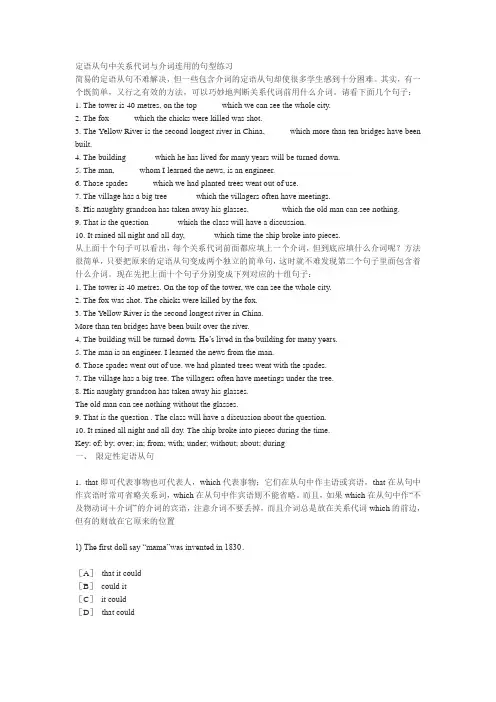
定语从句中关系代词与介词连用的句型练习简易的定语从句不难解决,但一些包含介词的定语从句却使很多学生感到十分困难。
其实,有一个既简单,又行之有效的方法,可以巧妙地判断关系代词前用什么介词。
请看下面几个句子:1. The tower is 40 metres, on the top _____ which we can see the whole city.2. The fox _____ which the chicks were killed was shot.3. The Yellow River is the second longest river in China, _____ which more than ten bridges have been built.4. The building ______ which he has lived for many years will be turned down.5. The man, _____ whom I learned the news, is an engineer.6. Those spades _____ which we had planted trees went out of use.7. The village has a big tree ______ which the villagers often have meetings.8. His naughty grandson has taken away his glasses, _______ which the old man can see nothing.9. That is the question ______ which the class will have a discussion.10. It rained all night and all day, ______ which time the ship broke into pieces.从上面十个句子可以看出,每个关系代词前面都应填上一个介词,但到底应填什么介词呢?方法很简单,只要把原来的定语从句变成两个独立的简单句,这时就不难发现第二个句子里面包含着什么介词。
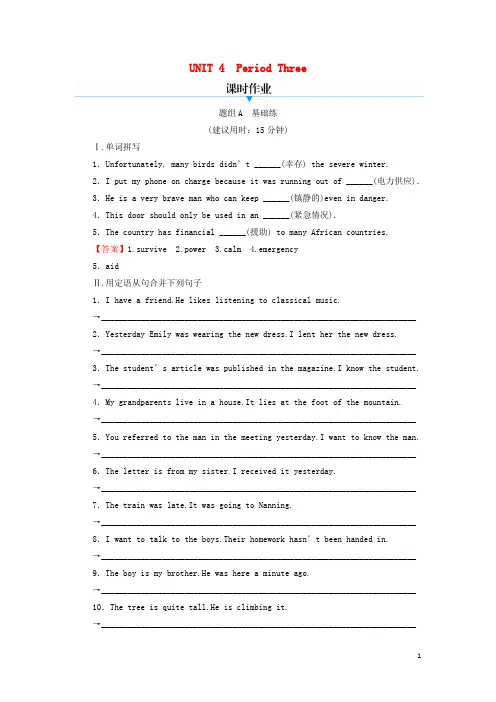
UNIT 4 Period Three题组A 基础练(建议用时:15分钟)Ⅰ.单词拼写1.Unfortunately, many birds didn’t ______(幸存) the severe winter.2.I put my phone on charge because it was running out of ______(电力供应).3.He is a very brave man who can keep ______(镇静的)even in danger. 4.This door should only be used in an ______(紧急情况).5.The country has financial ______(援助) to many African countries.【答案】1.survive 2.power 3.calm 4.emergency5.aidⅡ.用定语从句合并下列句子1.I have a friend.He likes listening to classical music.→________________________________________________________________________ 2.Yesterday Emily was wearing the new dress.I lent her the new dress.→________________________________________________________________________ 3.The student’s article was published in the magazine.I know the student. →________________________________________________________________________ 4.My grandparents live in a house.It lies at the foot of the mountain.→________________________________________________________________________ 5.You referred to the man in the meeting yesterday.I want to know the man. →________________________________________________________________________ 6.The letter is from my sister.I received it yesterday.→________________________________________________________________________ 7.The train was late.It was going to Nanning.→________________________________________________________________________ 8.I want to talk to the boys.Their homework hasn’t been handed in.→________________________________________________________________________ 9.The boy is my brother.He was here a minute ago.→________________________________________________________________________ 10.The tree is quite tall.He is climbing it.→________________________________________________________________________【答案】1.I have a friend who likes listening to classical music.2.Yesterday Emily was wearing the new dress (that/which) I lent her.3.I know the student whose article was published in the magazine.4.My grandparents live in a house which/that lies at the foot of the mountain.5.I want to know the man (whom/who/that) you referred to in the meeting yesterday.6.The letter (that/which) I received yesterday is from my sister.7.The train that/which was going to Nanning was late.8.I want to talk to the boys whose homework hasn t been handed in.9.The boy who/that was here a minute ago is my brother.10.The tree (that/which) he is climbing is quite tall.Ⅲ.微写作我父亲在离我们家不远的一家医院工作。
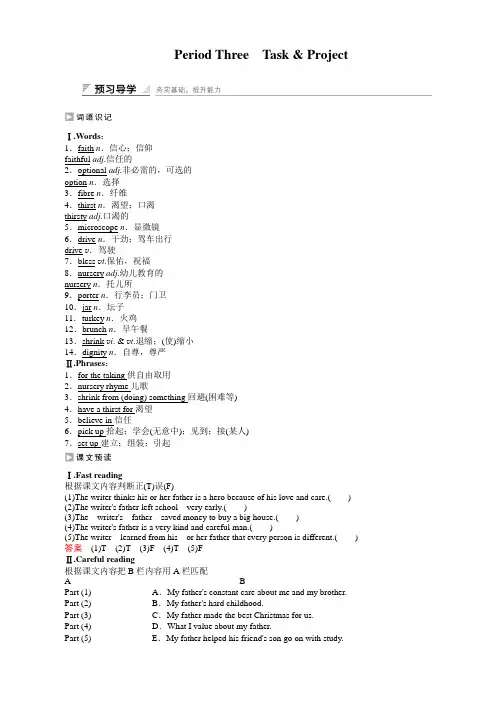
Period Three Task & ProjectⅠ.Words:1.faith n.信心;信仰faithful adj.信任的2.optional adj.非必需的,可选的option n.选择3.fibre n.纤维4.thirst n.渴望;口渴thirsty adj.口渴的5.microscope n.显微镜6.drive n.干劲;驾车出行drive v.驾驶7.bless v t.保佑,祝福8.nursery adj.幼儿教育的nursery n.托儿所9.porter n.行李员;门卫10.jar n.坛子11.turkey n.火鸡12.brunch n.早午餐13.shrink v i. & v t.退缩;(使)缩小14.dignity n.自尊,尊严Ⅱ.Phrases:1.for the taking供自由取用2.nursery rhyme儿歌3.shrink from (doing) something回避(困难等)4.have a thirst for渴望5.believe in信任6.pick up拾起;学会(无意中);见到;接(某人)7.set up建立;组装;引起Ⅰ.Fast reading根据课文内容判断正(T)误(F)(1)The writer thinks his or her father is a hero because of his love and care.()(2)The writer's father left school very early.()(3)The writer's father saved money to buy a big house.()(4)The writer's father is a very kind and careful man.()(5)The writer learned from his or her father that every person is different.() 答案(1)T(2)T(3)F(4)T(5)FⅡ.Careful reading根据课文内容把B栏内容用A栏匹配A BPart (1)A.My father's constant care about me and my brother. Part (2) B.My father's hard childhood.Part (3) C.My father made the best Christmas for us.Part (4) D.What I value about my father.Part (5) E.My father helped his friend's son go on with study.Part (6) F.My father's good qualities of success.Part (7) G.My father helps in our local community.Part (8) H.My father's optimism.答案(1)D(2)A(3)B(4)C(5)G(6)E(7)F(8)H1.This is because some people possess certain qualities that others do not have.这是因为一些人拥有其他人所不具备的品质。
Period Three Word power & Grammar and usageⅠ.语境填词1.We waited for them to give us the ________(信号) to move.2.It is a ________(普遍的) tendency for the Middle School students to take a mobile with them.3.Wang Lei was made ________(队长) of our football team.4.An ________(飞机) in American English is often replaced by an aeroplane in British English.5.He paid no attention to my w________.6.My aunt wanted to be an a________ starring in Hollywood films.7.Ten shop a________ are needed in this supermarket.8.A s________ in heart disease was invited from Beijing to operate on her.Ⅱ.选词填空work out,dream of/about,work as,get in touch,at full speed,a great deal of,set foot in,ever since1.The car turned the corner ____________________.2.It must be a hard life,________________ a nurse in the far north.3.He has ____________________________ work to do.4.I tried to ________________________ with my old friend after I came back.5.They were surprised to see the different world when captain Cook and his men ____________________ Australia.6.Paul started sailing in 1986 and he’s been doing it ________________.7.They had the kind of house we could only ________________.8.If it doesn’t ________________,you can always come back here.Ⅲ.同义词辨析1.用base/basis填空(1)The most difficult problem that confronts an industrial ________ is how to avoid the danger of environmental pollution.(2)The main ________ of this drink is orange juice.(3)What’s the ________ for your opinion?2.用signal/sign/mark/symbol的适当形式填空(1)They had ignored the ________ of the approaching earthquake.(2)The sauce has left a ________ on his shirt.(3)At an agreed ________ they left the room.(4)“Fe” is the ________ for iron.(5)There is no ________ of life in outer space.3.用add/add to/add...to.../add up/add up to的适当形式填空(1)Your carelessness ______________ our difficulty.(2)The money he spent ________________________ no more than £1,000.(3)Every time I ________________ these figures I got a different answer.(4)I’d like tea with sugar ________________.(5)“And I quite agree,” he ________.4.用no more (...) than/not more (...) than填空(1)I got as much as pay,if __________________ you.(2)I could do it ________________________ you.You’d better ask Jim.He is good at it.(3)The whale is ________________ a fish ________ the dog is.Ⅳ.用所给词的适当形式填空1.She said she ________________(see) the film before.2.The teacher,with 6 girls and 8 boys of her class,________________(visit) a museum when the earthquake struck.3.When I got back to the shop,my bag ________________________(take) away by someone else.4.No sooner ________ I ________(go) out than he came to see me.5.—Why haven’t you asked her to come here?—She ________________(do) an important experiment when I found her and she ________________(not finish) it.6.The classroom ________________________(clean) before we ________(get) there yesterday.7.When we got to the station,the train ________ already ________(leave).8.The book ________________________(finish) by the end of last month.Ⅴ.单项填空1.Few people in this village________the earthquake.A.survived B.survives fromC.survived from D.has survived2.She is________a teacher and she is a singer as well.A.no more than B.not more thanC.less than D.more than3.His mother________a farmer.A.works as B.serves asC.acts as D.regards as4.—Why haven’t you bought any butter?—I________to but I forgot about it.A.liked B.wished C.meant D.expected5.When the accident happened,the speed was 120km/h________the car was driving.A.on which B.at whichC.in which D.for which6.—Let’s hurry.The performance will begin soon.—Oh,yes,but I________afraid that it________.A.was;already began B.was;had already begunC.am;already began D.am;has already begun7.You know,it was the most expensive room we________.A.would live in B.lived inC.had ever lived in D.have ever lived in8.The young girl sitting next to me on the plane was very nervous.She________before.A.hasn’t flown B.didn’t flyC.hadn’t flown D.wasn’t flying9.I arrived late;I________the road to be so icy.A.wouldn’t expect B.haven’t expectedC.hadn’t expected D.wasn’t expecting10.We________our breakfast when an old man came to the door.A.just have had B.have just hadC.just had D.had just had11.—Why didn’t you go to see the play?—________the whole story,I decided not to see it.A.Being told B.Because I had been toldC.Telling D.Having told12.—Peter,where did you guys go for the summer vacation?—We________busy with our work for months,so we went to the beach to relax ourselves.A.were B.have beenC.had been D.will be13.—Were you surprised by the ending of the film?—No.I________the book,so I already knew the story.A.was reading B.had readC.am reading D.have read14.It took me a long time before I was able to fully appreciate what they________for me.A.had done B.didC.would do D.were doing15.I was just going to cut my rose bushes but someone________it.Was it you?A.has done B.had doneC.would do D.will doⅥ.完形填空Now,Liu Xiang has become a famous figure.He__1__a new 110m hurdles world record__2__a time of 12.88 seconds at a super Grand Prix (大奖赛) meeting in Lausanne,Switzerland.Olympic champion Liu had jointly (共同地)__3__the previous world record of 12.91 seconds with Britain’s Colin Jackson.He equaled the mark Jackson set in 1993 on his way to__4__ China’s first male Olympic track gold medallist in 2004.“I feel__5__.I can’t believe it.__6__ is a dream,”Liu told reporters.“I have a__7__future and I want to get better__8__,”added Liu,who celebrated his 23rd birthday on July 13.“I never thought I could__9__the world record.I’m feeling very__10__,but very happy and very excited. Switzerland is my__11__place.I love Switzerland and Lausanne and the fans here,”Liu said.Liu had his first victory at a Grand Prix meeting in Lausanne in 2002 and broke Renaldo Nehemiah’s world junior record that had stood__12__1978 on the track.“I held the__13__best of 12.91 seconds for 13 years,but I believe Liu will hold the new record for__14__30 years,”said Britain’s Colin Jackson, who set the previous mark in Stuttgart,Germany on August 20,1993.“Liu’s advantage__15__the pace,which is extremely__16__for a hurdler.I’m very excited about the new world record.”said Jackson.“He (Liu) is a great star!He__17__concentrated on what he aimed at.__18__,he can run really fast under the hot weather of the game,”Jackson added.“Actually, I never__19__12.88 seconds before,but I guess Liu made it after getting more__20__.”1.A.made B.setC.took D.got2.A.with B.aboutC.at D.in3.A.held B.graspedC.caught D.handed4.A.become B.turnC.becoming D.turned5.A.perfectly B.comfortablyC.perfect D.well6.A.Everything B.AnythingC.Nothing D.Something7.A.long B.brightC.successful D.short8.A.one by one B.by and byC.step by step D.one after another9.A.break B.destroyC.interrupt D.disturb10.A.tiring B.gladC.tired D.upset11.A.lucky B.beautifulC.best D.missing12.A.until B.toC.since D.in13.st B.firstC.before D.previous14.A.only B.no more thanC.at least D.at most15.A.depends on B.is depended onC.bases on D.is based at16.A.great B.impossibleC.important D.wonderful17.A.sometimes B.oftenC.ever D.always18.A.To my surprise B.In my surpriseC.At my surprise D.For my surprise19.A.thought about B.thought overC.thought of D.thought back20.A.experience B.adviceC.suggestions D.experiences1.过去完成时常用于no sooner...than...和hardly(scarcely)...when(before)等句型中,从句常用一般过去时。
Period Three Grammar & Writing单元语法——名词转化为动词和will/be going to表示将来Ⅰ.课文原句感知a.名词转化为动词1.When Zhou Kai’s mother saw him heading(head) towards the front door without a jacket on,she eyed(eye) him anxiously.2.And I’m not overweight so I never have to diet(diet).b.will和be going to表示将来1.Can you lie down,please,and I will examine(examine) you?2.I will write(write) you a prescription.3.My wife is going to visit(visit) her this afternoon.4.My wife is going to pick(pick) me up in a quarter of an hour.5.And I will ring(ring) the hospital.Ⅱ.用will或be going to的正确形式填空1.It will become warm when spring comes.2.She has bought some cloth;she is going to make herself a dress.3.The telephone is ringing.I will answer it.4.—Where is the telephone book?—I will go and get it for you.5.She has thought it over.She is going to see Mr Wang this afternoon.一、名词转化为动词英语中,同一词可以转化词性,而词义没有多大改变,这在构词法中叫做词的转化。
定语从句知识结构图解概念:定语可以由形容词,名词,代词,分词,不定式以及介词短语等来担任,也可以由一个句子来充当,充当定语功能的句子称为定语从句. ①指人的先行词⒈先行词:被定语从句所修饰的名词或代词②指物的先行词★先行词还可以是前面整个句子所叙述的事情。
He has passed the driving test, which surprises all of us. (which替代前面所叙述的事情)先行词①替代前面的先行词 (替代作用)关系词的作用②连接主句和定语从句(连接作用)③在定语从句中作句子成分(成分作用)定语从句“三要素" ⒉关系词: 引导定语的词标准:根据关系词在从句中做的句子成分种类关系词的分类关系代词:在从句中做主,宾,表,定(that/which/who/whom/whose/as)关系副词:在从句中作状语(When/where/why)⒊定语从句:用来做定语,修饰限定先行词的句子。
①限制性定语从句:对先行词起限定修饰作用。
定He is a teacher who works at our school.定语从句的分类②非限制性定语从句:对先行词起补充说明作用(先行词与定语从句之间有逗号隔开)语Beijing, which is the capital of China, is a beautiful city with a long history。
比较:He has two sons,who work in the same company. (He has only two sons。
)从He has two sons who work in the same company。
(Perhaps he has two more sons)句①关系代词在定语从句中作宾语She is the girl (whom / that)I loved before. (可以省略whom/that)②关系代词在定语从句中作表语⒈关系代词的省略He is no longer the boy (that)he used to be。
一、定语从句的概念:在复合句中修饰名词或代词的从句叫做定语从句。
定语从句有两要素,其一,被定语从句修饰的名词或代词叫做先行词。
定语从句必须放在先行词之后,对其先行词起限定作用。
关系词(引导定语从句)↑1.People who have the highest EQ are the most successful↓先行词(被修饰词)2.定语从句的分析步骤:⑴找出先行词⑵分析先行词在从句中充当的成分⑶对号入座选关系词--- 关键!二、关系代词1. 指人的关系代词: who / whom / that<1> 先行词在从句中作主语eg: A doctor is a person who / that looks after people’s health.<2> 先行词在从句中作宾语eg: Mr White invited many friends to his party (who / whom / that) he respected much.<3> 关系代词前有介词eg: Nancy is the right person on whom you can depend.<4> 小结:⑴指人的关系代词中,在从句中充当主语的是who和that,且在句中不可以省略。
⑵指人的关系代词中, 在从句中充当宾语的是who,that和whom,且可以省略。
⑶当关系代词前有介词时,指人只能用whom。
2.指物的关系代词: which / that<1> 先行词在从句中作主语eg: The river which / that runs through the city brings us lots of pleasure.<2> 先行词在从句中作宾语eg: The book (which / that) you just laid on the shelf is mine.<3> 关系代词前有介词eg: Here is the money with which I will buy a piano.<4> 小结:如何选定语从句中的关系词:⑴指物的关系代词中,在从句中充当主语的是which和that,且在句中不可以省略。